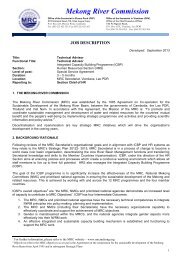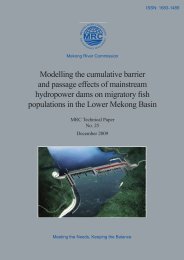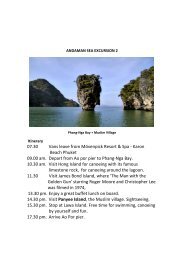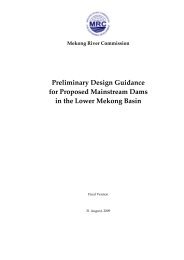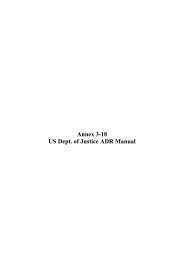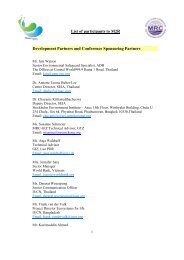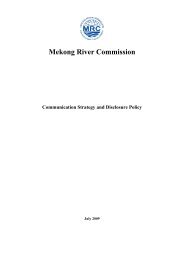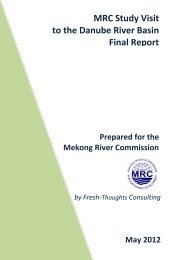Carriage, Handling and Storage of Dangerous Goods along
Carriage, Handling and Storage of Dangerous Goods along
Carriage, Handling and Storage of Dangerous Goods along
You also want an ePaper? Increase the reach of your titles
YUMPU automatically turns print PDFs into web optimized ePapers that Google loves.
Institutional <strong>and</strong> Capacity Building (continued)<br />
VESSELS 89<br />
Each person should receive training, proportional to risks in the event <strong>of</strong> a release <strong>of</strong> dangerous cargoes<br />
<strong>and</strong> the functions he/she performs, on:<br />
1. methods <strong>and</strong> procedures for accident avoidance, such as proper use <strong>of</strong> package h<strong>and</strong>ling<br />
equipment <strong>and</strong> appropriate methods <strong>of</strong> stowage <strong>and</strong> segregation <strong>of</strong> dangerous cargoes;<br />
2. necessary emergency response information <strong>and</strong> how to use it;<br />
3. general dangers <strong>of</strong> the various types <strong>and</strong> classes <strong>of</strong> dangerous cargoes <strong>and</strong> how to prevent<br />
exposure to their hazards including, if appropriate, the use <strong>of</strong> personal protective clothing<br />
<strong>and</strong> equipment; <strong>and</strong><br />
4. immediate procedures to be followed in the event <strong>of</strong> an unintentional release <strong>of</strong> dangerous<br />
cargoes, including any emergency procedures for which the person is responsible <strong>and</strong> the<br />
personal protection procedures to be followed.<br />
Such training should be provided or verified upon employment in a position involving the transport or<br />
h<strong>and</strong>ling <strong>of</strong> dangerous cargoes <strong>and</strong> should be periodically supplemented with retraining, as deemed<br />
appropriate by the regulatory authority.<br />
The regulatory authority should establish minimum requirements for training <strong>and</strong>, where appropriate,<br />
qualifications for each person involved, directly or indirectly, in the transport or h<strong>and</strong>ling <strong>of</strong> dangerous<br />
cargoes. Regulatory authorities involved in the development or enforcement <strong>of</strong> legal requirements<br />
relating to the supervision <strong>of</strong> transport or h<strong>and</strong>ling <strong>of</strong> dangerous cargoes should ensure that their<br />
personnel are adequately trained, the level <strong>of</strong> training according with their responsibilities.<br />
The minimum staffing level for (tanker) barges should be regulated by the authorities as well as the<br />
required competence. To obtain this, courses should be provided <strong>and</strong> followed by examination <strong>and</strong><br />
certification. Courses should include ship technology, safety, regulations, mechanical equipment <strong>and</strong><br />
maintenance <strong>and</strong> h<strong>and</strong>ling <strong>of</strong> dangerous goods. These courses should have a theoretical as well a<br />
practical part.<br />
The maximum number <strong>of</strong> (consecutive) working hours, the minimum number <strong>of</strong> resting hours per<br />
day, the minimum age <strong>of</strong> crewmembers should be regulated by the authorities.<br />
The number <strong>of</strong> days crewmembers are onboard should be recorded, <strong>and</strong> controlled by the respective<br />
authorities. This can be used to check on their experience <strong>and</strong> gives possibilities in limiting the years<br />
or months <strong>of</strong> duty required to obtain a higher rank, such as from mate to master.<br />
Important Note:<br />
The Vietnam Inl<strong>and</strong> Waterway Administration (VIWA) operates three vocational schools. These are<br />
the Inl<strong>and</strong> Waterway School in Nam Dong Village near Hanoi, the Inl<strong>and</strong> Waterway School in Ho Chi<br />
Minh City <strong>and</strong> the Inl<strong>and</strong> Waterway Technical Worker School in Haiphong.<br />
3.3.4.2 Drugs <strong>and</strong> Alcohol<br />
RECOMMENDATION<br />
Member Countries should ensure that ship operators develop a drug <strong>and</strong> alcohol policy.<br />
CHALLENGE<br />
Recognising the potentially serious impact <strong>of</strong> marine incidents, the Oil Companies International<br />
Marine Forum (OCIMF), <strong>and</strong> the marine industry in general have developed guidance aimed at<br />
encouraging safe ship operation <strong>and</strong> protection <strong>of</strong> the environment. Guidelines for the control <strong>of</strong><br />
drugs <strong>and</strong> alcohol onboard are in the best interests <strong>of</strong> the whole maritime industry <strong>and</strong> in doing so



